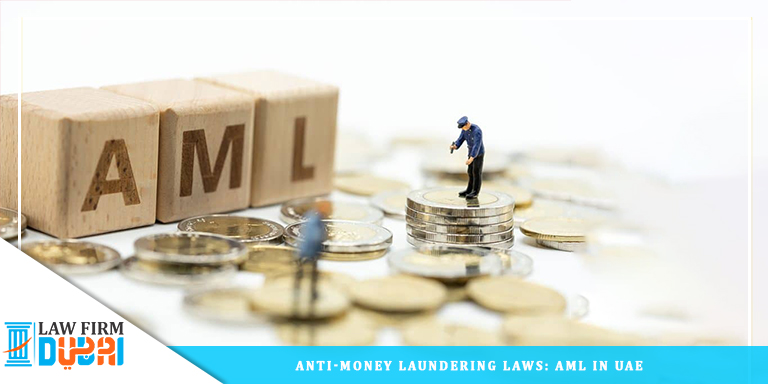
Anti-money Laundering Laws: AML in UAE
UAE has a huge financial market that attracts billions of investments every year. There are endless opportunities available for all stakeholders. Nonetheless, opportunities are connected to challenges and threats. UAE is no different from other nations. UAE is considered to be the favorite place for financial criminal activities. Money launderers considered the UAE economy the best option to convert their black money into White. However, this is no longer applicable. We are one of the top Dubai Law Firms. Because we are connected with No.1 Law Firm in Dubai.
UAE government takes serious actions
The government of the UAE has taken very serious steps to get on track and has made sincere efforts to curb money laundering activities in the UAE. There are plenty of problems in financial markets which need to be addressed promptly. The government of UAE is quite vigilant in addressing financial crimes. They try to combat them with a robust regulatory framework. Please consult or contact a professional Dubai Law Firm for an understanding of Uthe AE government’s rules and regulations.
Regulations
The basic motive behind the regulations and laws is to provide greater transparency in the financial market. Furthermore, Anti-Money Laundering (AML) laws are well-designed to safeguard the country’s economy. Besides, the UAE has joined hands with the Financial Action Task Force (FATF) to achieve its objective. UAE is no longer a safe haven for the money launderers as before.
UAE is committed to enforcing local laws with the best international standards. Financial Action Task Force (FATF) is an international entity that operates worldwide for money laundering activities. They oversee and establish the regulations, standards, and best practices for different nations. Anti-money laundering laws AML are aligned with the guidelines from FATF.
Criminal Offense
Money laundering is a criminal offense. The procedure of money laundering involves 3 major steps. It includes placement, layering, and integration. It is the procedure of showing legal sources for money that is obtained in illegitimate ways. It is quite a common practice globally. The legal framework of the UAE addresses the money laundering issue very seriously. Therefore, they have implemented strong legal measures to curb the anti-money laundering activities in the UAE. The federal decree law was introduced for the first time in 2018. The federal law is named the Anti-Money Laundering and Combatting the Financing of Terrorism (AML-CFT) Law.
Federal Laws
The federal law carefully explains what is money laundering. Besides, it also provides details about the associated activities that form part of money laundering activities in UAE. The Anti-money laundering AML outlines the punitive measures for money launderers in the Emirates. There are very stern penalties including heavy fines, jail sentences, imprisonment, and even deportation. Penalties cover the individuals as well as entities and businesses involved in money laundering activities in the UAE. Our Law Firm in Dubai specialises in dealing with such matters.
Reporting Specifications
The AML explains the reporting specifications for the businesses, financial institutions, and designated non-financial entities including DNFBP. These entities need to report all types of suspicious activities to the concerned authorities.
Combatting Financial Crimes in UAE
AML has key elements to combat the financial crimes in UAE. It suggests a Customer Due Diligence (CDD) exercise. All the financial institutions and DNFBP are specific to conduct it. It is carried out to identify the client along with its detailed verification. CDD helps in assessing the risk factors. The CCD process initiates with identifying the customers and beneficial owners. Therefore, verification is done to have a better understanding of the purpose of the business and the relationships. Following this, they will monitor the ongoing transactions. This scrutiny will assist in highlighting the unusual and suspicious activities.
STR: Reporting
Secondly, Suspicious Transaction Reporting (STR) is another key feature of AML. It requires entities and financial institutions to file for STRs. Filing is done if there are suspects of money laundering activities. Filing is done with the relevant authorities in UAE named the UAE’s Financial Intelligence Unit (FIU). STR plays a crucial role in identifying financial crimes. Furthermore, they are also responsible for carrying out the in-depth investigations.
AML Guidelines
According to the AML guidelines, a risk-based approach is employed in the UAE. Therefore, the entities and financial institutions must assess the risks first. It is a foremost step towards mitigating the risk from business operations and customer profiles. Record Keeping is an essential ingredient of AML laws. An AML law requires that entities should maintain a record of all the transactions along with a thorough customer record for at least 5 years. These records can later be used for audits and investigations.
More federal laws unleash money laundering activities in UAE. Federal law of 2014 emphasizes combatting terrorist financing and others. However, the Central Bank of UAE is also active in battling financial crimes. They issue a detailed circular regularly along with detailed guidelines. Moreover, they ensure compliance with Anti-money laundering Laws AML within the banking sector of Emirates.
Penalties for Non-Compliance
There are strict penalties for non-compliance. Individuals and entities anyone who fails to comply with AML law will face serious consequences. According to the AML laws, the fines can range from AED 50,000 which can go up to AED 5 Million. The financial penalty depends upon the severity of the violation.
Serious Offense
Money laundering is a very serious criminal offense in UAE. This can result in an imprisonment of up to 10 years and even more. Those entities that have serious issues of non-compliance with Anti-Money Laundering Laws AML may face license revocation. Their license can even be suspended for a brief time or revocation in serious situations.
Relevant authorities in the UAE are allowed to freeze the assets of the money launderers in the UAE. Anyone who is associated with money laundering activities in the UAE will lose all his assets, property, and money.
Recent developments are quite common in AML laws. This displays the UAE’s commitment to addressing the emerging threats and challenges. Furthermore, they are more according to the guidelines from FATF and have align the AML laws with the international standards to improve accountability and transparency.
UAE has also improved its collaboration with international organizations like FATF and INTERPOL to battle cross-border money laundering activities and financial crimes. As a result, it gives the UAE a secure economic environment where ethical business practices are carried out. This improves the UAE’s financial integrity and also compels them to avoid any restrictions or penalties.



